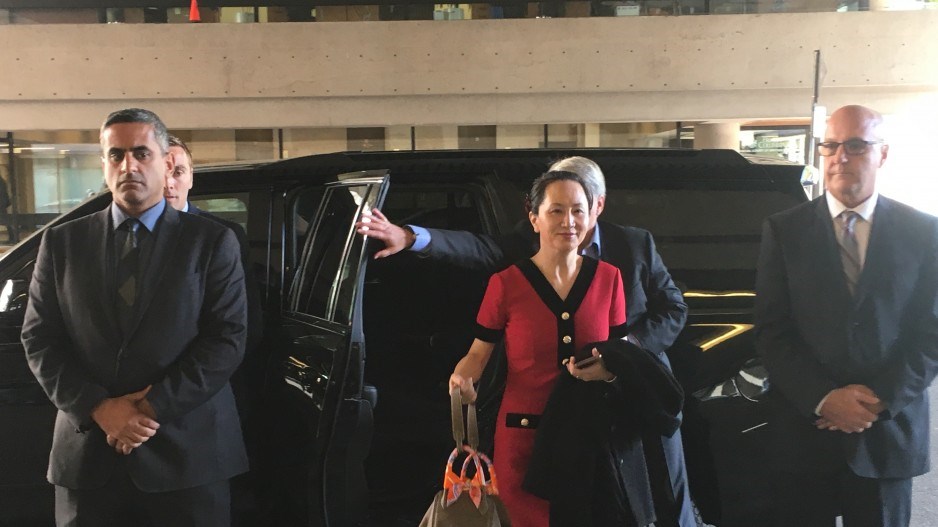The extradition hearing for Huawei Technologies Co. Ltd. CFO Meng Wanzhou continues today in Vancouver, with Crown counsel led by attorney Robert Frater calling the information requested by the defence irrelevant to the process.
Frater added that - if the court allows Meng's application for additional information from U.S. and Canadian authorities to stand - the extradition hearing could quickly devolve from its proper purpose to that of a jury trial, which would go against the original purpose of the hearings.
"The court must keep the hearing on the straight and narrow," Frater said. "You [associate chief justice Heather Holmes] have the ability to do so by refusing to spend precious court time and resources on things that have no power of success. You have that authority."
Frater began presenting the Crown's case this morning, stating that the argument for additional information disclosure from U.S. authorities need to be kept on course and not veer into judging the merits or the trustworthiness of the record of the case (ROC) as presented by American officials.
While Frater said Meng's defence also agreed the extradition hearing should not veer into the jurisdictions of a full jury trial in assessing evidence, defence lawyers' arguments on the ROC's reliability - along with the use of the term "causality" - moves the discussion "dangerously close" to something outside the reach of an extradition hearing.
Frater added that the merit of the ROC - under precedents on the dominant case thread of how to handle an extradition case, including one of Holmes' own previous rulings - is something that's up to the foreign court of the requesting state (the United States) to decide post-extradition, in a formal trial setting.
"What they [the defence] are trying to do is to say... the U.S. theory of the case doesn't hold up in U.S. law," Frater said. "To that, I say, tell it to a U.S. court.... The precedents on the dominant case thread points to dismissal [of Meng's disclosure application]."
The defence, as expected, started the day by targetting the trustworthiness of U.S. authorities' account of the Chinese executive's alleged wrongdoings.
Meng's defence spent the entirety of Monday's court session focusing their fire on the topic of the record of the case (ROC) an supplemental record of the case (SROC) provided by the U.S. Department of Justice to the Attorney General of Canada as the reasoning for the extradition request. Lawyer Scott Fenton criticized the ROCs as demonstrating a negligence or willful intention to carry out the requesting state's "duty of candour" in describing Meng's alleged criminal activity of fraud.
Fenton especially noted the representation in the ROC of a 2013 powerpoint presentation made by Meng to financial institution HSBC, saying that U.S. records sent to court did not represent Meng having fully disclosed Huawei and subsidiary Skycom's operations in Iran - as she did in the powerpoint, Fenton stated.
The defence also targetting a number of items they felt were misrepresentations of Meng's activities with HSBC, culminating in a claim that the U.S. ROCs are "unreliable" and more disclosure of information is needed.
However, Frater said Tuesday that narrative fits a "tried and true strategy" of blaming the victim in that Meng is trying to put the responsibility of Huawei's Iran transactions going through the U.S. banking system on HSBC.
The Crown attorney added that the evidence affidavits submitted by Meng - including those from banking experts saying HSBC had the ability to clear the U.S. dollar transactions from Iran outside of the United States, thus not triggering sanction violations - are entirely irrelevant to the extradition process at-hand.
"What the ROC and the SROC said was that the transactions did clear through the U.S.," Frater said. "The idea that HSBC could have cleared them otherwise, so what? ... The hypothetical circumstance that HSBC cleared [the transactions] somewhere else is interesting, but not useful at all [for assessing extradition]."
Frater concluded Tuesday's argument by saying the defence's request for the court to look at the entirety of Meng's powerpoint to HSBC also needs an assessment of context - that the document showed the Huawei executive intending to mislead the bank on the tech company's relationship with Skycom in order to maintain banking relations with HSBC.
The Crown attorney added that any other attempts to paint a greater picture of conspiracy by the defence should be rejected as something that's reserved for an eventual trial in the United States.
"When you take inadmissible evidence and pair it with irrelevant evidence, that cannot add up to something," Frater said. "It can’t give any weight to anything else."
The hearings this week are expected to conclude on Wednesday.




